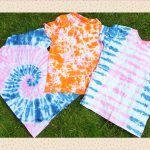You’d think a mandated Stay at Home Order would be this introvert’s dream. A few months ago, as Joe panicked about not being able to venture out of the house, I smugly thought to myself, “I was made for this.”
Fast forward a couple of days, and who was the one begging for social interaction? Me.
It was the first of many surprises brought on by the pandemic. A break from the daily grind has shown a shift in me—one that’s brought me closer to accepting who I am without the approval of peers and onlookers.
Over the past sixty days, there have been bottomless glasses of wine. Fights with Joe. A move and the sale of our home. Even with all that’s still keeping us busy and the break from our daily routines, there have been times I’ve found myself sitting with discomfort day in day out. It feels dull, sort of like an itch you can’t quite reach—just faint enough to live with but ever-present enough to make you feel…off.
I chatted with my friend, Dahlia, about it around day twenty. She nailed what we both were feeling. Neither of us had slowed down like this since we were children. And both of us were feeling things we hadn’t felt in a very, very long time.
Then she said something that struck me hard. She said she told her family that they were seeing the true her, the unfiltered version of her, for the first time. In a way, we were both discovering we had been editing ourselves for our families and friends. We’d been dealing with any discomfort we felt by getting lost in work. We’d been covering it up through socializing, through keeping busy, keeping distracted, and keeping moving.
In a way, we were both discovering we had been editing ourselves for our families and friends. We’d been dealing with any discomfort we felt by getting lost in work. We’d been covering it up through socializing, through keeping busy, keeping distracted, and keeping moving.
It was powerful to hear this from a friend who is always so strong, always powering through. She is the one who keeps it together, makes it work, and finds the positive. It was rare to hear her admit something so vulnerable. I asked her how it felt, and she said, “New. And overdue.”
They say big life disruptions are often the tipping point. The point when it comes time to confront the turmoil bubbling beneath our consciousness. Sometimes we are forced to confront those realities on our own timeline. Sometimes, we have an intuitive feeling that we need to make big changes. And sometimes, we’re forced to deal with it without any warning (thanks, COVID-19).
This hasn’t been a comfortable journey, and as our state begins to reopen this week, it doesn’t feel joyous. I know a lot of us are feeling more anxious than ever. We’re beginning to step out into a world that will never quite look the same.
I’ve thought a lot about what it means to sit with this discomfort, to see life’s distractions for what they are, and the privilege they represent. Life might not look the same for most of us, but what we do with this new world will make all the difference. Today I’m sharing five lessons I’ve learned from living without many of the external distractions I’ve historically relied on for comfort, and what they’ve taught me about myself.
I hope these personal reflections help you consider whatever feelings you are currently processing. They are here to offer a perspective and to help you frame your own. I also would encourage you to use the comments section to share what you’ve learned about yourself over the course of the past few months. The more we share about our vulnerable realizations in response to all that’s going on, the more empowered others will feel to do the same.
1. Isolation has brought up feelings of fear, insecurity, and unhappiness with my current life.
The feeling Dahlia talked about experiencing—the one where there was nothing to do but be who you are, flaws and all—brought up a different kind of reckoning for me. I have everything I could have dreamed of ten years ago, and yet I found myself stretching and reaching for the next thing to keep me occupied. When I would wrap up projects both big and small, I would feel a sense of emptiness that I would promptly fill with something else. My therapist once used a duck analogy to help explain what she was observing in me. On the surface, it looked like I was gliding through life, moving naturally and easily in my natural habitat. But underwater, my legs were moving tirelessly; I was afraid if I stopped, I would sink, or worse, I’d admit it was all harder than it looked.
Being socially distant really showed me that all that vigorous paddling—all the doing—is connected to how to see my value. If I just existed and did nothing at all—didn’t put out content, make meals for the kids, or build a beautiful home—would I still feel proud of who I was?
All that vigorous paddling—all the doing—is connected to how to see my value. If I just existed and did nothing at all—didn’t put out content, make meals for the kids, or build a beautiful home—would I still feel proud of who I was?
It is one of the biggest lessons of therapy that I had yet to fully understand, probably because I hadn’t been forced to slow down enough to confront the impulse to prove my worth through work. And now, even though I’m working, the health of my family and team and friends and community come before all I want to do to keep busy. And all that’s left is how I care and respect for my fellow neighbor.
The good news is I’m learning to like the me who isn’t always doing things to prove my worth. I am learning who this person is and what my deeper needs are. I’m feeling more confident in my likes and preferences outside of the Instagram algorithm. It’s a new feeling, one I’m trying to protect and let grow in me. Who knows, maybe this is what true self-love might look like.
2. Isolation has shown me new ways to experience joy.
Once I identified the compulsive need to keep moving, improving, and excelling, I started to look for ways to find joy that had nothing to do with validation of any kind. I started observing my surroundings with all of my senses. How did our yard sound in the morning? What birds were living with us? How did the grass smell? I noticed the way Winnie’s whole body wiggles when she says hello in the morning. The sound of my kids laughing. A loving hand squeeze from Joe. All of this was happening around me…and I was off thinking about writing an Instagram caption.
The more intentional I’ve been in appreciating an unfiltered life, the less tense I feel when it comes to actually applying my craft these days. I feel…happier, at times. I’m more at peace with my lows. I’m more at peace with just being alive. I see fewer issues and changes to make and a lot more of the good that already exists. I stopped seeing things as “ugly” or “dated” or “something to fix” and instead asked, “How would a small, doable change make life even easier?”
I’ve found there is a very different feeling when you want something versus when you need it. Need is egoless; needs help everyone live a little better. Wants and needs can align, but wants can get in the way of appreciating what joy exists in the moment.
3. Isolation has helped me stop being so judgmental, both of myself and others.
This pandemic has taught us a lot about how hard it is to live in “gray areas.” As we begin to reopen and begin to make decisions for ourselves and our families, it’s been hard for me at times to not judge what others decide to do during this crisis. When I realized how complex these decisions will be—like what family members to see, what services to start again, and how to navigate crowds—I had to give up the idea we can control what others do. I also have had to suspend judgment in order to fully accept we have very little control in our lives.
I’m focusing on feeling in alignment with the choices I make for myself, not how they look in the eyes of others. And it has given me more empathy for people who need to make different choices for their families.
It’s a hard pill to swallow, but it has helped me learn to focus on reframing, and finding empowerment in the impact of my own actions. When you’re coming from the mindset that everyone is doing everything wrong, it’s easy to distract yourself from how you contribute to the problem. Instead of judging, I’m focusing on feeling in alignment with the choices I make for myself, not how they look in the eyes of others. And it has given me more empathy for people who need to make different choices for their families.
4. Isolation has helped me confront my own consumption.
Not being able to run out to get what I need on a dime has really shed a light on my own privilege. It’s shed a light on how I not only benefit from being white but also from being able-bodied, having a vehicle, and not living paycheck to paycheck. It’s put into perspective many of the privileges I’ve become disconnected to and helped me connect with a path forward, especially when it comes to the new house.
I’ve asked myself why living with what is isn’t enough. Just because we CAN change aspects of our new house, why do we NEED to? Why rush? Why not be influenced by need and functional improvements? The full reason why we moved into the house we did during this pandemic will be shared soon. And I can’t say we won’t ever renovate our new place. But for now, I LOVE it as it is, I fully see the opportunities we have that others don’t, and I have a renewed connection to the days when I lived paycheck to paycheck, before the brand collaborations and perks of being an “influencer.” This new house was certainly possible because of this privilege, and it’s up to me to stay connected to what matters most and draw boundaries for myself, our business, and the future of our home.
5. Isolation has shown me that alcohol plays a role in feeding my desire to find distance from my feelings.
I woke up with a raging hangover after my first Zoom happy hour. How in the world was it possible that I drank ONE AND A HALF bottles of wine?! Over the course of the past two months, the bottles started being opened earlier—at 4:30, and then 3:45. We went through a case of wine faster than we ever had. There was a pile of bottles that I couldn’t confront. It wasn’t like anyone else had overserved me, or any friend had ordered another bottle despite my insistence that I didn’t need it.
Without distractions, like shopping and socializing and new projects, alcohol became a very quantifiable and visible symptom of my desire to escape from my feelings.
This is the one lesson I’m still working on reframing. Right now, I’m asking myself what else I could do to feel relief. What am I actually trying to avoid? What thoughts contributed to my urge to have a glass of wine? What thoughts could I replace them with that would make it easier to have a different outcome or result?
What am I actually trying to avoid? What thoughts contributed to my urge to have a glass of wine? What thoughts could I replace them with that would make it easier to have a different outcome or result?
If I had to wrap all these lessons up in a nice little bow, it would be that I’ve learned how powerful my thoughts about my situation can be. Feeling the need to drink for relief is one of many signals that help me identify when I need to check in with myself.
I don’t know what all these feelings mean. I do know they feel new, like little seedlings that need to be protected and fostered to grow into new dialogues and beliefs I have within myself. When I think about what the world will look like after all of this, my hope is that we have more tolerance and acceptance for our internal selves and the complicated journey we’re all embarking on. It affects how we treat others, how we treat ourselves, and how we view the world. Who knows, maybe we’re at the beginning of an awakening of some kind. I’m optimistic about the future, no matter how scary it is to venture outside.
What discomfort has isolation brought you? What lessons have you learned about yourself? Please remember to be kind when reading and responding to each other’s experiences, as they all differ and the Internet provides little room for gray areas (and tone of voice) when it comes to expressing oneself.

Kate is currently learning to play the Ukulele, much to the despair of her husband, kids, and dog. Follow her on Instagram at @witanddelight_.










